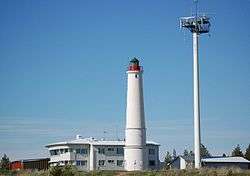Hailuoto
| Hailuoto Karlö | ||
|---|---|---|
| Municipality | ||
| Hailuodon kunta | ||
|
Pilot station and lighthouse in Marjaniemi | ||
| ||
 Location of Hailuoto in Finland | ||
| Coordinates: 65°01′N 024°43′E / 65.017°N 24.717°ECoordinates: 65°01′N 024°43′E / 65.017°N 24.717°E | ||
| Country | Finland | |
| Region | Northern Ostrobothnia | |
| Sub-region | Oulu sub-region | |
| Government | ||
| • Municipal manager | Ari Nurkkala | |
| Area (2011-01-01)[1] | ||
| • Total | 1,082.70 km2 (418.03 sq mi) | |
| • Land | 200.53 km2 (77.43 sq mi) | |
| • Water | 882.17 km2 (340.61 sq mi) | |
| Area rank | 104th largest in Finland | |
| Population (2016-03-31)[2] | ||
| • Total | 996 | |
| • Rank | 323rd largest in Finland | |
| • Density | 4.97/km2 (12.9/sq mi) | |
| Population by native language[3] | ||
| • Finnish | 99.1% (official) | |
| • Swedish | 0.1% | |
| • Others | 0.8% | |
| Population by age[4] | ||
| • 0 to 14 | 13.9% | |
| • 15 to 64 | 61.5% | |
| • 65 or older | 24.6% | |
| Time zone | EET (UTC+2) | |
| • Summer (DST) | EEST (UTC+3) | |
| Municipal tax rate[5] | 19.25% | |
| Website | www.hailuoto.fi | |
Hailuoto (Swedish: Karlö) is an island and a municipality in Northern Ostrobothnia region, Finland. The population of Hailuoto is 996 (March 31, 2016)[2] and the municipality covers an area of 200.53 km2 (77.43 sq mi) (excluding sea areas) of which 1.70 km2 (0.66 sq mi) is inland water (January 1, 2011).[1] The population density is 4.97/km2 (12.9/sq mi).
Hailuoto is located on an island of the same name opposite the city of Oulu in the Gulf of Bothnia. A ferry operates regularly between Hailuoto and Oulunsalo. In winter an official ice road connects the island to the mainland.
Land in the region is constantly rising due to post-glacial rebound. It is estimated that the first parts of Hailuoto appeared from the Baltic Sea about 1700 years ago. The current island of Hailuoto was formed from many smaller islands. Two large sections, Santonen and Hanhinen merged into the main island (Luoto) only about two centuries ago. The island is continuously expanding and eventually it will join with the continent. Kirkkosalmi, a wetland region between Hanhinen and Luoto is renowned for being an important bird refuge where rare bird species are observed.
Gallery
 Typical forest in Hailuoto
Typical forest in Hailuoto Hailuoto Church, built in 1972
Hailuoto Church, built in 1972 Old church, built in the 1610s, destroyed by fire in 1968
Old church, built in the 1610s, destroyed by fire in 1968- The ferries Meriluoto and Merisilta
- The ice road between the island and the mainland
 Fishing boats in Marjaniemi
Fishing boats in Marjaniemi
References
- 1 2 "Area by municipality as of 1 January 2011" (PDF) (in Finnish and Swedish). Land Survey of Finland. Retrieved 9 March 2011.
- 1 2 "Ennakkoväkiluku sukupuolen mukaan alueittain, maaliskuu.2016" (in Finnish). Statistics Finland. Retrieved 31 March 2016.
- ↑ "Population according to language and the number of foreigners and land area km2 by area as of 31 December 2008". Statistics Finland's PX-Web databases. Statistics Finland. Retrieved 29 March 2009.
- ↑ "Population according to age and gender by area as of 31 December 2008". Statistics Finland's PX-Web databases. Statistics Finland. Retrieved 28 April 2009.
- ↑ "List of municipal and parish tax rates in 2011". Tax Administration of Finland. 29 November 2010. Retrieved 13 March 2011.
External links
 Media related to Hailuoto at Wikimedia Commons
Media related to Hailuoto at Wikimedia Commons- hailuototourism.fi
- Municipality of Hailuoto – Official site (Finnish)
 Hailuoto travel guide from Wikivoyage
Hailuoto travel guide from Wikivoyage- Ferry timetables (Finnish)
- Bothnian Bay Research Station of the University of Oulu
- Live webcam from the ferry


